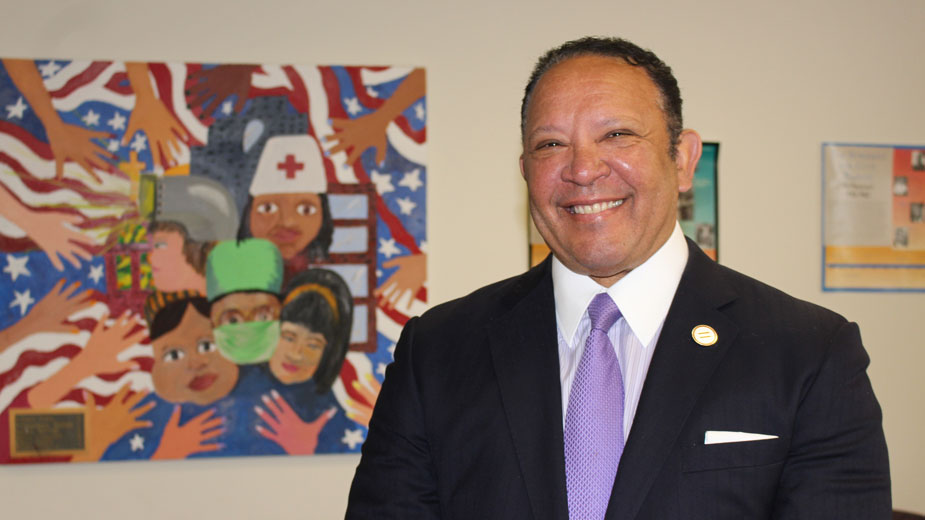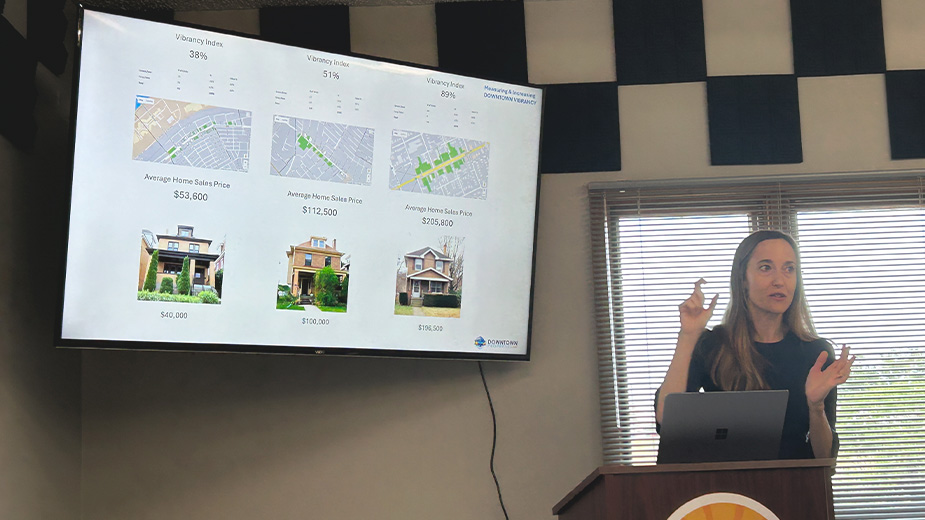Tech Industry Slow to Diversify, Urban League CEO Says
FARRELL, Pa. – The vast majority of African Americans own a smart phone and an equally large percentage of black households contain a computer.
Yet while African Americans are leading the way in terms of consumer trends in the tech industry, they’ve been shut out of the job market when it comes to careers with Silicon Valley giants such as Google, Twitter or Facebook, the CEO and president of the National Urban League said Friday.
“African Americans trail when it comes to employment in these West Coast tech firms,” said Marc H. Morial, who has served as the National Urban League’s CEO since 2002.
Morial addressed reporters during a press event Friday at the Shenango Valley Urban League to discuss the organization’s annual State of Black America report, released May 4. The report uses an equality index to measure how blacks fare when compared to whites in areas such as housing, education, economics and social justice.
The CEO also served as the keynote speaker for the Shenango Valley Urban League’s 50th anniversary banquet, held Thursday evening.
This year’s report devoted a special focus to digital inclusion, finding that while black consumers are helping to power the country’s tech industry, the number of African Americans employed in tech jobs is far fewer when compared with whites.
According to the report, about 90% of African Americans own smartphones and 89.3% of black households have a computer. Yet the percentage of blacks actually employed in the tech industry is quite small, Morial said.
“Google, Twitter and Facebook combined have over 40,000 employees,” Morial said. “Less than 1,000 of them are African American.”
Less than 5% of the overall workforce of the country’s major tech companies is black, the report continued, while nearly 50% is white. The lack of inclusion to high-paying tech jobs in turn has an impact on the overall household income of African American families. In 2018, the average median income for white households stood at $63,155 compared to just $38,555 for African American households.
On the other hand, those companies considered “legacy” firms, such as broadband providers Comcast, Spectrum, AT&T, Verizon and Charter, have embraced diversity and have embedded diversity programs within their human resources departments.
“They’re not perfect,” Morial noted. “But if these companies can achieve diversity, so too can Google, Twitter, and Facebook.
“We’re encouraging these companies to embrace diversity and to hire in a way that reflects America and also in a way that reflects their consumers,” he said.
The report also sheds light on racial inequality in other sectors, and notes that slight improvements have been made in economics and education since the previous year’s survey. However, African Americans suffered slight setbacks in health care.
Still, the overall status of black Americans hasn’t changed much, especially in the context of the current political environment, said Morial, who served as Mayor of New Orleans during the mid-1990s.
He said people are becoming more aware of this because digital technology has enabled rapid communication across social media platforms.
Headline-grabbing incidents such as the arrests of two black men at a Starbucks in Philadelphia for sitting in the café without ordering drew widespread attention because the episode was recorded on a cell phone and went viral.
“The fact that many of these incidents are more transparent forces people to be more accountable,” Morial said. “I think it was remarkable how quickly Starbucks responded to the incident.”
Morial said the company demonstrated the sort of corporate responsibility that others should emulate. Yet the political and policy winds in Washington are complicating issues for the country’s most vulnerable.
“There’s no question in this political environment, hate incidents have risen,” he said, citing figures compiled by the Southern Poverty Law Center, which tracks hate groups and incidents of hate crimes every year. “There are many public policies offered that would do damage to civil rights progress, that would do damage to economic justice progress. We’re on the front lines pushing back those efforts.”
Morial said it doesn’t make sense to cut programs – such as the Women, Infant and Children, or WIC – for people who need them the most when Congress has approved a tax cuts that benefit corporations and the wealthiest Americans.
Erin Houston, the Shenango Valley Urban League’s president and CEO, said the local chapter is a vital component of the community, especially through its WIC program.
“We serve 3,200 women every year,” Houston said. “There are also other programs that impact health, wellness and housing.”
An important initiative ready to relaunch this summer is the Youth Apprenticeship program, Houston noted. The program enrolls students ages 12 through 15 and introduces them to basic communications skills, interviewing skills and other aptitudes needed to be successful in securing a job.
“We want to giver them this experience before they’re work-age eligible,” Houston said.
Morial said the Urban League has excelled in helping young people get through high school and move on to post-secondary education, Morial said. The organization has in addition made great efforts helping people with financial literacy and housing issues, job training and workforce development, and small-business assistance through its Urban League Entrepreneurship Centers.
“Our financial literacy program is focused on home ownership,” he said. Before the Great Recession hit in 2008, the organization was helping 2,500 people a year get into stable mortgage loan products with a fixed interest rate.
During the foreclosure crisis that followed, the agency stepped in to provide assistance to homeowners facing the loss of their house, he noted. “About 1/3 of our clients were white,” he said. “In some cases, we were the best or most visible agencies – or we were the only ones doing it.”
Among the biggest hurdles is finding the funding to maintain most of these programs, Morial said, since all of the Urban League’s services are free of charge.
“Our approach is to put our constituents first, our communities first, and the politics come second,” he said.
Copyright 2024 The Business Journal, Youngstown, Ohio.



